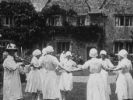Eye For Film >> Movies >> Arcadia (2017) Film Review
Arcadia
Reviewed by: Jennie Kermode

Once there was a dream that was England. A dream of Britain, dating back to ancient times, drawn from broad meadows and dark, mysterious forests, soundtracked by the rushing of rivers and by waves crashing up against the coast. The moist air, the salt-tainted wind, the rich scent of the soil. Rolling green hills yearn upward towards pale blue skies - albeit often in black and white – in Paul Wright’s poetic documentary. This is a land in which Jerusalem might be built, a gateway to Heaven and Hell.
With a soaring score by Portishead’s Adrian Utley and Goldfrapp’s Will Gregory, this film is a hypnotic blend of archetypal imagery that casts a spell over the viewer. Like ancient magic, it’s unpredictable, carrying one down into darkness as easily as up towards the light. Occasional phrases or snatches of dialogue slide into the soundscape so fluently that the conscious mind barely takes in the words. We watch small boys set up games of cricket, Morris dancers assemble on a village green, coal-stained faces in an anguished crowd as banners are held aloft and the tutored tones of Margaret Thatcher find their place among the flutes and horns. Occasionally we travel north, witnessing the exoticised behaviours of mysterious Celtic types in a more rugged land, but for the most part this is England’s tale, a victory song full of majesty and awe and despair.

Despite its fluid structure and lack of explanatory narrative, Arcadia is not a film that demands a great deal of the viewer; rather, the viewer should guard against its seduction; it’s all too easy to be told what to think and feel. The film itself is alert to this, sometimes building up alluring visual sequences that lead to uncomfortable places, and in this way it comments on the ease with which national pride can slide into fascism.
Through all this, there is one consistent motif: the land itself, and the way it is treated by its inhabitants. The darkness and brutishness of encroaching industrial architecture recall Tolkein’s warnings about the irrevocable loss of something sacred, Mordor’s sprawl pressing up against the Shire. There’s sleight of hand at work here, because some of that industrial imagery is considerably older than the blissful pastoral scenes we see beforehand, but it’s an important point nonetheless – and director Paul Wright clearly wants to highlight the complexity of the issue. The men we see hurling themselves down a hill in the Great Cheese Roll are wearing late 20th Century clothing. These traditions continue, as if representative of some pagan element never fully conquered by the country’s waves of settlers, its new religion or its devotion to capitalism. For all that the playing of Jerusalem might summon memories of How To Get Ahead In Advertising, Blake’s mental fight goes on.
You don’t need to be English – or even British – to appreciate this brilliantly constructed film. Though unlikely to reach a wide audience, it is an example of art for art’s sake that is nevertheless profoundly accessible. Its historical imagery may make you nostalgic; you may find yourself weeping for what was lost, even if it was somebody else’s dream; or you may surrender to the spell and dream once more, even if you know that there’s no future in it.
Reviewed on: 25 Feb 2018
















